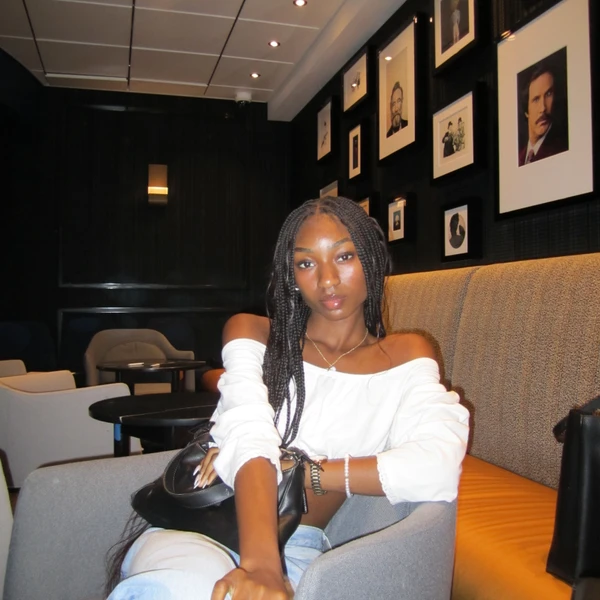
Hobbies and interests
Acting And Theater
African American Studies
Ballet
Biology
Chinese
Cinematography
Dance
Directing
Playwriting
Fashion
Sewing
Drawing And Illustration
Painting and Studio Art
Reading
Romance
Realistic Fiction
Classics
Short Stories
Academic
I read books daily
Danielle Aseme
1,385
Bold Points1x
Finalist
Danielle Aseme
1,385
Bold Points1x
FinalistBio
I'm a student driven by purpose, passion, and a commitment to justice. Whether through law, film, or fashion, I aim to spotlight overlooked stories and humanize those society often misunderstands. As a Black girl navigating both Nigerian and African American identities, I’ve learned to thrive in complexity—blending cultures, challenging monolithic ideas of success, and embracing my voice. From mentoring peers and supporting veterans to amplifying social justice through media, I strive to create change that feels as personal as it is powerful.
Education
New York University
Bachelor's degree programMajors:
- Law
- Philosophy
Minors:
- Film/Video and Photographic Arts
Choate Rosemary Hall
High SchoolMiscellaneous
Desired degree level:
Doctoral degree program (PhD, MD, JD, etc.)
Majors of interest:
- Film/Video and Photographic Arts
- Law
- Philosophy, Politics, and Economics
- Philosophy
Career
Dream career field:
Motion Pictures and Film
Dream career goals:
To work with Jordan Peele, and or Entertainment Law
Intern/Blog Writer
Taubes Law2024 – 2024
Sports
Tennis
Junior Varsity2021 – 20254 years
Lacrosse
Junior Varsity2021 – 20254 years
Dancing
Varsity2020 – 20255 years
Arts
Choate Rosemary Hall
Cinematography2025 – 2025
Public services
Volunteering
National Veterans Council of Legal Redress — I managed social media for NVCLR, creating content that raised awareness about dishonorable discharges and helped translate legal advocacy into accessible, human-centered stories.2023 – 2025
Future Interests
Advocacy
Politics
Volunteering
Philanthropy
Entrepreneurship
Love Island Fan Scholarship
There is something addictive about watching people fall in love — or at least watching them try. I’ve always been fascinated by reality television, not for the drama or the dating, but for what it reveals about how people construct themselves when they know they’re being watched. Love Island might seem like a sun-drenched vacation for hot people, but to me, it’s something closer to social psychology — a high-stakes performance where contestants aren’t just trying to find love. They’re trying to be believed.
What makes the show work — and what makes it dangerous — is how deeply the Islanders buy into their own narratives. They edit themselves in real time, choosing which parts of their personalities to show and which to soften. And they’re not alone. In a world shaped by algorithms and applause, we all do it. We all curate, revise, and hope our intentions are read correctly by whoever happens to be watching.
That’s why I’ve been drawn to the moments on Love Island where those carefully constructed versions of self begin to collapse — challenges like Movie Night, where secrets are aired on screen, or the infamous Mail Challenge, where Islanders hear what others really think of them. But the most compelling evolution of these challenges might be one that hasn't aired yet: Public Opinion Court — a concept that pushes the show's psychological stakes beyond lust or loyalty and into something more confronting: perception.
In this imagined challenge, Islanders are presented with quotes and judgments from two groups — the public and past Islanders who’ve watched from outside the villa. These are people who’ve seen the storylines unfold with clarity, who remember what was said on Day 2 just as vividly as Day 20. When they speak, it cuts deeper than gossip. It’s analysis. Observation. Critique. And the Islanders, who have spent weeks crafting their on-screen personas, are forced to reckon with what they’ve really communicated — not what they meant, but what was received.
I think about that gap often — between intention and perception. Growing up, especially as a Black girl balancing different cultural identities, I learned early how to shift depending on the space I was in. Sometimes I was too bold. Other times, too careful. But always aware that someone was watching, and that how I was seen could either protect or punish me. That’s what Public Opinion Court really surfaces: not just how we perform, but who pays the price when our performances fall short.
In this challenge, Islanders must guess whether a quote is about them, who said it, and whether it came from the public or someone who once stood exactly where they’re sitting. And when they’re wrong — when they misread how others have read them — the fallout isn’t just dramatic. It’s revealing. Because being told you’re fake by someone you trusted is one thing. Being told it by the world outside is something else entirely.
But maybe that kind of exposure is necessary. Maybe we all need a version of Public Opinion Court — something that forces us to stop mistaking our self-perception for truth. Because we all want to be loved for who we think we are. But love — real love, whether from a partner or an audience — demands honesty. And honesty starts where the performance ends.